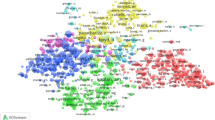Abstract
Political communication has never been as important as it is today. International conflict and a global economic crisis have left governments seeking to justify their actions and calm the fears of their citizens. This paper offers an account of an exploratory study into the process of political communication. Using a constructivist grounded theory methodology, it identifies models that require modernisation and amalgamates them into a broader model that reflects the political communications experience of the respondents. It concludes with some consideration of the implications for not only the field of political marketing communications but for marketing communications as a whole.





Similar content being viewed by others
References
Allan G (2003) A critique of using grounded theory as a research method. Journal of Business Research Methods 2(1):1–10
Brassington F, Pettitt S (1997) Principles of marketing. Pitman, London
Browne K (2005) Snowball sampling: using social networks to research non-heterosexual women. Int J Soc Res Methodol 8(1):159–162
Charmaz K (1983) The grounded theory method: an exlication and interpretation. In: Emerson R (ed) Contemporary field research,a collection of readings. Little Brown Company, Boston
Charmaz K (2000) Grounded theory—objectivist and constructivist methods. In: Denzin NK, Lincoln YS (eds) Handbook of qualitative research. Sage, London
Chicchi F (2000) Grounded theory and the biographical approach: an attempt at an intergrated heuristic strategy. Int Rev Sociol 10:5–23
Dermody J (2005) Young people's attitudes towards British political advertising: nurturing or impeding voter engagement? J Nonprofit Public Sect Mark 14(1/2):129–148
Druckman JN (2001) On the limits of framing effects: who can frame? J Polit 63:1041–1066
Fiske J (2002) Introduction to communication studies. Routledge, London
Gaber I (2004) Alastair Campbell, exit stage left: do the ‘Phillis’ recommendations represent a new chapter in political communications or is it ‘business as usual’? J Publ Aff 4:365–373
Glaser B (1978) Theoretical sensitivity : advances in the methodology of grounded theory. Sociology, Mill Valley
Glaser B, Strauss A (1967) The discovery of grounded theory: strategies for qualitative research. Aldline, Chicago
Goulding C (1998) Grounded theory: the missing methodology on the interpretivist agenda. Qual Market Res Int J 1:50–57
Goulding C (2002) Grounded theory: a practical guide for management, business and market researchers. Sage, London
Guba E, Lincoln Y (1994) Fourth generation evaluation. Sage, London
Krugman HE (1965) The impact of television advertising: learning without involvement. Public Opin Q 29:349–356
Loudon D, Della Bitta AJ (1989) Consumer behavior: concepts and applications, 3rd edn. McGraw-Hill Inc., New York
MacInnis DJ, Jaworski BJ (1989) Information processing from advertisements: toward an integrative framework. J Mark 53:1–23
MacInnis DJ, Moorman C, Jaworski BJ (1991) Enhancing and measureing consumers motivation, opportunity and ability to process brand information from ads. J Mark 55:32–53
Mariampolski H (2001) Qualitative market research; a comprehensive guide. Sage, London
Mortimore R (2003) Why politics needs marketing. Int J Nonprofit Volunt Sect Mark 8/2:107
Mowen JC (1995) Consumer behaviour, 4th edn. Prentice Hall, Englewood Cliffs
Mundorf N, Zillman D, Drew D (1991) Effects of disturbing televised events on the acquisition of information from subsequently presented commercials. J Advert 20:46–53
Newman BI, Sheth JN (1985) A model of primary voter behaviour. J Consum Res 12:178–187
Riley R (1996) Revealing socially constructed knowledge through quasi-structured interviews and grounded theory analysis. J Travel Tour Mark 15:21–40
Scammell M (1999) Political marketing: lessons for political science. Polit Stud 47(4):718–739
Schiffman LG, Kanuk LL (2000) Consumer behaviour, 7th edn. Prentice-Hall Inc.
Schramm WL (1955) The process and effects of mass communication. University of Illinois Press, Urbana
Schwandt TA (2000) Three epistemological stances for qualitatitive enquiry. In: Denzin N, Lincoln Y (eds) Handbook of qualitative research. Sage, London, pp 189–213
Sears DO (1969) Political behavior. In: Lindzey G, Aronson E (eds) The handbook of social psychology, vol. 5. Addison Wesley, Reading MA, pp 315–458
Shannon C, Weaver W (1949) The mathematical theory of communication. University of Illinois Press, Illinois
Solomon M, Banossy G, Askegaard S (2002) Consumer behaviour - a European perspective. Prentice Hall, Europe
Strauss A, Corbin J (1990) Basics of qualitative research: grounded theory procedures and techniques. Sage, London
Strauss A, Corbin J (1994) Grounded theory methodology: an overview. In: Denzin N, Lincoln Y (eds) Handbook of qualitative research. Sage, Newbury Park
Tellis GJ (1998) Advertising and sales promotion strategy. Addison Wesley, Reading MA
Watson J (2003) Media communication—an introduction to theory and process. Palgrave Macmillan, Basingstoke
Westley B, MacLean M (1957) A conceptual model for communication research. Journalism Q 34:31–38
Wu BT, Newell SJ (2003) The impact of noise on recall of advertisements. J Mark Theory Pract 11(2):56–65
Author information
Authors and Affiliations
Corresponding author
Rights and permissions
About this article
Cite this article
Lloyd, J. Keeping both the baby and the bathwater: scoping a new model of political marketing communication. Int Rev Public Nonprofit Mark 6, 119–135 (2009). https://doi.org/10.1007/s12208-009-0036-7
Received:
Accepted:
Published:
Issue Date:
DOI: https://doi.org/10.1007/s12208-009-0036-7




